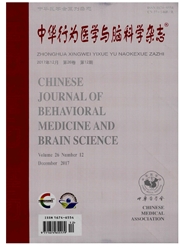

 中文摘要:
中文摘要:
目的 研究肝豆状核变性病(H LD)患者记忆监测的情况,同时探讨HLD患者记忆障碍的可能机制.方法 建立情景记忆(EM)及语义记忆(SM)的知道感(FOK)实验范式,对30例HLD患者及30例年龄及教育程度相匹配的健康对照者(HC)进行研究.结果 与HC组的FOK-EM的线索回忆率[(64.17±29.21)%]以及FOK-SM的线索回忆率[(84.72±11.44)%]比较,HLD患者组FOK-EM的线索回忆率[(26.55±20.92)%]、FOK-SM的线索回忆率[(53.93±28.42)%]显著降低,差异有统计学意义(t=-5.140,P<0.01;t=-5.123,P<0.01);FOK-EM的肯定判断/正确再认成绩[(50.64±29.43)%]、否定判断/正确再认成绩[(12.80±18.32)%]与HC组的肯定判断/正确再认成绩[(75.15±31.73)%]、否定判断/正确再认成绩[(1.81±5.41)%]之间差异有统计学意义(t=-2.693,P<0.05;t=3.026,P<0.01);且stroop效应与FOK-EM的否定判断/正确再认成绩呈正相关(r=0.601,P<0.01).结论 HLD患者在情景记忆FOK中表现为对自身再认能力的低估,低估程度与执行功能的损害相关,提示前额叶功能损伤可能是导致HLD患者情景记忆障碍的重要因素,同时相对保留的语义记忆FOK提示二者可能依赖不同的神经机制.
 英文摘要:
英文摘要:
Objective To investigate the memory monitoring ability in patients with hepatolenticular degeneration(HLD) and explore the mechanism of their memory impairment.Methods The feeling-of-knowing (FOK) paradigm of episodic memory(EM) and semantic memory(SM)were established and subsequently applied to 30 HLD patients and 30 healthy control(HC) participants who were matched in age and educational level.Results Compared with healthy control group (FOK-EM recall (64.17 ± 29.21) % ; FOK-SM recall (84.72 ± 11.44)%),the FOK-EM recall((26.55±20.92)%) and FOK-SM recall((53.93±28.42)%) in HLD patients were significantly lower(t=-5.140,P<0.01 ; t=-5.123,P<0.01).The positive judgment and correct recognition of FOK-EM ((50.64±29.43) %) and the negative judgment and correct recognition of FOK-EM((12.80± 18.32) %) in the HLD group were significantly different from the HC group (the positive judgment and correct recognition of FOK-EM:(75.15±31.73)% and the false judgment and correct recognition of FOK-EM:(1.81±5.41)%; t=-2.693,P<0.05 ; t=3.026,P<0.01).Most importantly,the stroop effect was positively correlated with the negative judgment and correct recognition of FOK-EM in HLD group(r=0.601,P<0.01).Conclusion The results show that the HLD group underestimate their memory performance on episodic FOK,and the impairment of memory monitoring is positively correlated with the deficit of executive function,indicating that the prefrontal impairment can be an influential factor of memory disorder in HLD,whereas the unimpaired semantic metamemory FOK indicates the episodic and semantic metamemory monitoring may depend on different neural network.
 同期刊论文项目
同期刊论文项目
 同项目期刊论文
同项目期刊论文
 Dissociation of decision making under ambiguity and decision makingunder risk: A neurocognitive endo
Dissociation of decision making under ambiguity and decision makingunder risk: A neurocognitive endo Selective impairment of attention networks in breast cancer patients receiving chemotherapy treatmen
Selective impairment of attention networks in breast cancer patients receiving chemotherapy treatmen Dissociation of decision making under ambiguity and decision making under risk: A neurocognitive end
Dissociation of decision making under ambiguity and decision making under risk: A neurocognitive end Trait-related decision making impairment in obsessivecompulsive disorder: evidence from decision mak
Trait-related decision making impairment in obsessivecompulsive disorder: evidence from decision mak Dissociation of Neural Substrates of Response Inhibitionto Negative Information between Implicit and
Dissociation of Neural Substrates of Response Inhibitionto Negative Information between Implicit and Selective impairment of attention networks in breast cancerpatients receiving chemotherapy treatment
Selective impairment of attention networks in breast cancerpatients receiving chemotherapy treatment Modul- ation of interhemispheric functional coordination in electroconvulsive therapy for depression
Modul- ation of interhemispheric functional coordination in electroconvulsive therapy for depression 期刊信息
期刊信息
